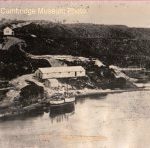Cambridge Collections
River Travel

The Invasion of the Waikato 1864.
Excerpt from ‘Such Things Were’ by C W Vennell (1939)
“Tamehana’s stronghold at Te Tiki o te Ihingarangi [Pukekura] was definitely threatened, and his watchers renewed their vigilance. On the morning of the 3rd March [1864], their patience was rewarded, and they beheld a sight which must have suggested that all the taniwhas in the Waikato had merged into one great monster, breathing fire and smoke. What had begun as a smudge on the distant landscape, scarcely distinguishable from the blue haze in which the river lost itself towards Ngaruawahia, gradually grew, until a plume of smoke lay in the still air along the winding course of the river. Gradually, as the look-outs watched, it grew nearer. At last they could wait no longer. Mounting their horses a party of warriors galloped down the hillsides and across the plain to intercept the intruder, or at any rate, to find out what was his purpose.
“To those of the Ngati-haua who had made the three day journey by canoe down the river to Auckland, a steamer was not exactly a novelty; and those who had fought in the earlier engagements of the Waikato war had seen these ungainly river craft, with their loop-holed turrets and death-dealing guns. The sight of one so far upstream, in the heart of their own country must have sent a chill of terror through the breasts of those who had stayed at home to guard their kaingas, and particularly the women and children who had not yet set eyes on such fire-breathing monsters. To Tamehana it was an indication of the direction from which the attack, which he had so accurately anticipated, would come.”
Later in his book C W Vennell explains how settlers came to Cambridge.
“At Auckland a three or four days’ journey into the unknown interior lay before them. The way south lay along the same road that the soldiers had used. In a bullock dray, climbing laboriously up long steep ridges, and down into deep valleys, bumping in and out of ruts, bogged on occasions in mud, it was a long and wearisome day’s journey over the Pokeno Hills to Mercer. A spring cart, or in later days a coach, may have provided slightly faster transport, but scarcely less uncomfortable, particularly for the young wives and their children.
“At Mercer, goods and chattels, wives and children were transferred to the river steamer. It did not bump perhaps (except occasionally on a sand-bank or a submerged snag) but its progress was slow, and the end of the second day would see them probably no further than Ngaruawahia. As the river narrowed, and the current flowed faster, the paddle steamer would pant its way upstream on the third day, until with a sigh of relief, the newcomers would disembark, with all their worldly possessions, at the Pukerimu landing. This was the usual journey.”
A Journey by Steamboat up the Waikato River in 1877.
Excerpt from ‘Nation Making’ by J C Firth
“About midnight we entered the Narrows. The thick darkness and the rapid current of the flooded river, made the navigation of the Narrows no easy matter. Captain Spargo, whose coolness and skill I could not but admire, now lit his lamps, in the shape of two large iron braziers, one on each side of the deck, forward of the paddle-boxes. Just before entering the Narrows the fires in the braziers were in full blaze; two sailors constantly feeding them with wood and coal-tar. By this means, notwithstanding the thick darkness and surging current, the steamer was kept in mid stream; and slowly forged ahead, like some grim monster with fiery eyes, fighting against the black, rushing river. As she dashed the water from her bows, the liquid fire illuminated the surging spray, and at intervals, as we passed a waterfall, fringed with shining foliage, it sparkled for an instant with rare and glittering beauty.
“At length we reached the jaws of the Narrows under a full head of steam. The boat ground on her way through the seething waters; thud, thud went the engines, louder and louder roared the steam, driving from the funnel a fiery fountain of glowing sparks; whilst sheets of flame danced from the braziers, threatening every moment to set fire to the paddle-boxes.”
